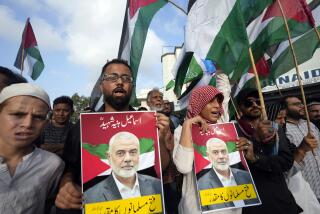U.N. Reaction Mild as U.S. Explains Raid
UNITED NATIONS — Invoking the U.N. Charter’s right of self-defense, U.S. Ambassador Madeleine Albright officially notified the Security Council on Sunday that the United States had attacked a Baghdad intelligence center because of the outrage over an Iraqi attempt to assassinate former President George Bush.
Her notification, complete with huge photos of the alleged Iraqi-made car bomb and detonators, did not require any action by the council. Most ambassadors, however, made statements accepting and understanding the U.S. position, although some of the rhetoric was lukewarm. There were few fiery denunciations of Iraqi President Saddam Hussein and few wholesale embraces of the American evidence.
“I am not asking the council for any action,” Albright told the ambassadors in the unusual open session, “but in our judgment every member here today would regard an assassination attempt against its former head of state as an attack against itself and would react.”
Iraqi Ambassador Nizar Hamdoun, speaking softly in his usual unemotional manner, denied any Iraqi involvement in the alleged plot and called on the Security Council to condemn the United States for an act of aggression against Iraq.
But the Security Council ignored his demand. Speaking to reporters afterward, Hamdoun said he doubted that many ambassadors found Albright’s evidence persuasive but that there was nothing they could do about it.
“Nobody could cancel what the United States did,” he said. “What’s the point? I think the whole procedure was absurd.”
Asked if he now expected a prolonged confrontation between the Clinton Administration and Hussein, Hamdoun replied: “It’s too difficult for me to predict. But I should expect the worst.”
Albright, however, expressed satisfaction with the statements from the ambassadors. “I’m delighted with the support of the Security Council and with the Security Council’s support of President Clinton’s action against Iraq,” she said.
The mood of the meeting was anticlimactic. Albright presented a condensed version of what already had been disclosed in Washington the day before and what most ambassadors had already viewed on television. The ambassadors were not required to reach any conclusions or pass any resolution but simply acknowledge the receipt of evidence.
A ringing endorsement of the U.S. position came from British Ambassador David Hannay. He called the missile strike “proper and proportionate” and “entirely justified.” But his words only made the comments of the others seem rather weak. Russian Ambassador Yuli Vorontsov, for example, in a very brief statement, said that he believes that the American action was justified but added quickly, “We hope there will be no military escalation.”
French Ambassador Jean-Bernard Merimee told the council that his government “fully understood the American action.” A French aide made it clear to reporters that in diplomatic parlance, full understanding was less than a full endorsement.
It was difficult to discern the views of the nonaligned ambassadors on the Security Council--Venezuela, Morocco, Djibouti, Pakistan and Cape Verde. Speaking on behalf of all five, Deputy Ambassador Jose Eduardo Barbosa of Cape Verde said they “had taken note” of the evidence presented by Albright and felt the subject was one “of utmost concern.”
And, in a pointed remark that seemed to move the focus to Bosnia-Herzegovina, where the United States and the rest of the council have done little to deter aggression against the Muslims, Barbosa said the nonaligned nations believe that U.N. resolutions “should be implemented in a non-discriminatory manner in the interest of preserving the credibility and moral authority of the Security Council.”
Albright, who has been making speeches outlining a new U.S. foreign policy that she calls “assertive multilateralism,” told the ambassadors that, in this case, there was “a direct attack on the United States . . . that required a direct United States response.” She said the ringleaders of the plot to kill Bush in Kuwait were two Iraqi nationals and that the entire plot was “planned, equipped and launched” by Iraq’s intelligence service.
In his address to the council, the Iraqi ambassador insisted that the United States had ignored “due process of law” in its bombing of the intelligence agency headquarters in Baghdad.
“It is another page in the American policy of aggression in Iraq to subjugate Iraq to its will,” Hamdoun said. “It is an example of United States’ hegemonistic policies. The attack on Baghdad, a city of 4 million people, was designed for political ends.”
* ARABS ASSAIL ATTACK: Double standard seen in missile strike on Baghdad. A8
More to Read
Sign up for Essential California
The most important California stories and recommendations in your inbox every morning.
You may occasionally receive promotional content from the Los Angeles Times.










